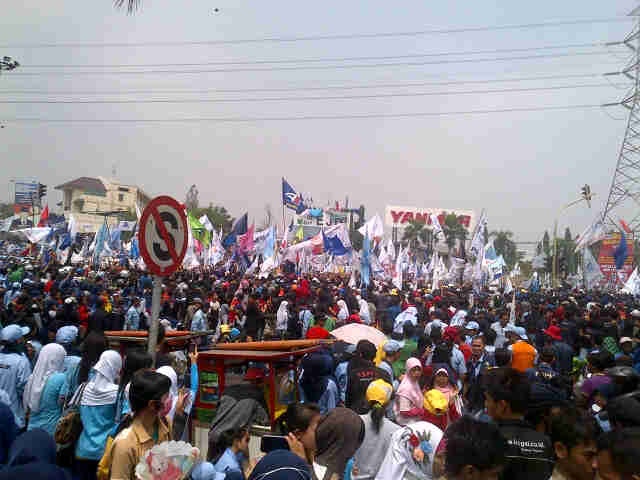3 October, 2012In the lead up to the October 7 Day for Decent Work, Indonesian unions took to the streets on 3 October in a massive protest against precarious work.
Organized by the Indonesia Workers’ Council, comprising national centres KSPI, KSBSI and KSPSI, the demonstrations attracted nearly 3 million participants. They were staged on 3 October in 21 districts and municipalities and 80 industrial zones throughout the Greater Jakarta area, as well as at the offices of Regional Parliaments. The largest protest involved some 500,000 people in seven industrial zones in Bekasi.
Said Iqbal, president of the Confederation of Indonesian Workers Unions (KSPI), said that the protests were called to demand a halt to the widespread practice of outsourcing. This results in workers receiving lower pay and benefits than if they were hired directly. The unions called on the government to prohibit outsourcing beyond five allowable areas and to revoke the licenses of outsourcing companies.
The union demands also included increases to the minimum wage, which is currently below levels in China, Thailand and Malaysia, and rejection of government proposals for workers to pay health insurance contributions instead of employers.
Meanwhile in Germany, IG Metall has released the results of its works council survey on precarious work. The survey results make it very clear that precarious employment is increasing, both in the form of agency labour as well as outsourcing. Precarious work is not only increasing in new jobs, in 1 in every 5 workplaces, precarious work is replacing permanent jobs. Agency work has become the standard instrument of precarious work, present in three quarters of workplaces and increasing in every third workplace.
In other developments, California governor Jerry Brown this week signed two bills sponsored by the labour movement to protect agency workers. One bill requires that agency workers be given more information about their pay rates and working hours for each assignment. The second bill makes user enterprises liable when they should have known that contracts entered into with a subcontractor were financially insufficient to comply with labour laws.



